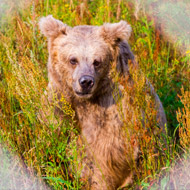
Kristina spent her days trapped inside a tiny cage
The last dancing bear in Ukraine can now recover in peace and tranquillity, thanks to the efforts of an international animal charity.
Bear Kristina was rescued by Four Paws in partnership with Ukranian authorities and has been moved to the safety of its newly-built bear sanctuary Domazhyr near Lviv.
The rescue mission took place last week, moments before Kristina was due to make an appearance in Ivao Frankove, Western Ukraine. Following hours of negotiations with Kristina’s uncooperative owner, police and environmental inspectors decided to intervene and seize the bear.
The bear was moved to the sanctuary where she will now be cared for and monitored until a court decides that she can stay there for good. At present, the confiscation is only temporary.
Carsten Hertwig, a FOUR PAWS bear expert who brought Kristina to her new home, says that while Kristina is doing well under the circumstances, her condition is not ideal.
“At first, we brought Kristina into an indoor enclosure so that she could get used to both her new surroundings and our bear keepers, who observed her behaviour closely. On her second day, they decided to let her into a larger outdoor enclosure,” she said.
Kristina spent much of life in terrible conditions. Her owner kept her inside a tiny cage in his van while she was paraded around circuses and restaurants. Sometimes temperatures inside the van could get as high as 30 degrees celsius.
Time and time again, Kristina’s owner insisted that she perform in circuses or pedestrian areas for public enjoyment. During the winter months, when ‘entertainment season’ was over, Kristina spent her days in a tiny shed on the grounds of fish factory.
Kristina, together with another bear rescued earlier this year, are the first residents of the species-appropriate, natural home. The sanctuary will eventually provide shelter to thirty bears that have previously been subject to abuse, neglect or cruelty.



 The latest
The latest